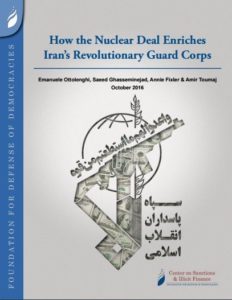The influence and reach of the Islamic Revolutionary Guard Corps (IRGC) in Iran’s economy and military is so extensive that it stands to be a primary beneficiary of the Joint Comprehensive Plan of Action, according to a report issued yesterday by the Foundation for Defense of Democracies (FDD).
Established in 1979 to consolidate the Islamic revolution and fight its enemies, the IRGC has evolved into a full-fledged conventional army that both conducts and directs terrorist activities while also acting as Tehran’s long arm in the Middle East. But it has also become an economic conglomerate, controlling nearly 40 percent of Iran’s economy. Together with the business juggernaut controlled by the supreme leader, with whom the IRGC cooperates, the most dangerous elements of the Islamic Republic dominate the Iranian economy.
The study, “How the Nuclear Deal Enriches Iran’s Revolutionary Guard Corps,” includes a sector-by-sector analysis of Iran’s economy and the IRGC’s influence. It finds that the IRGC has an overwhelming stake in nine key sectors: oil and gas, petrochemicals, metals and minerals, automotive, shipping, aviation, construction, banking and finance, and telecommunications sectors.
The IRGC uses the profits from these “legitimate” businesses to fund its military activities and sponsorship of terrorism and proxies abroad. It also rewards Guard members with money and positions in businesses, creating a network of current and former IRGC members who leverage their services for personal affluence, which translates into political influence.
The IRGC exploits its influence and capabilities into one part of Iran’s economy to increase its presence in another. The Guard’s growing economic clout is furthermore an end in itself and also a tool to support its activities throughout the region.
In other words, the IRGC is a state within a state.
Containing and rolling back the IRGC’s regional aggression necessitates a comprehensive strategy towards Tehran that involves all tools of American power.
Are you a dedicated reader of FDD's Long War Journal? Has our research benefitted you or your team over the years? Support our independent reporting and analysis today by considering a one-time or monthly donation. Thanks for reading! You can make a tax-deductible donation here.








